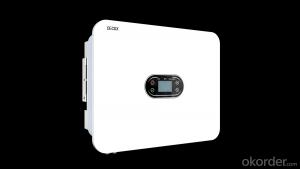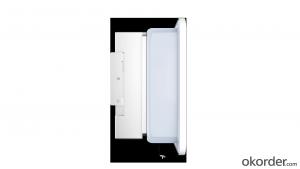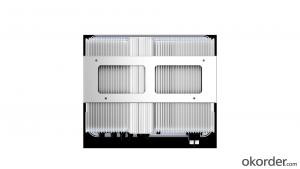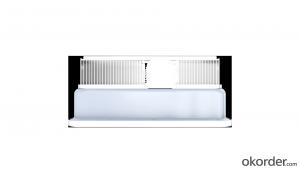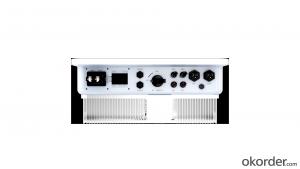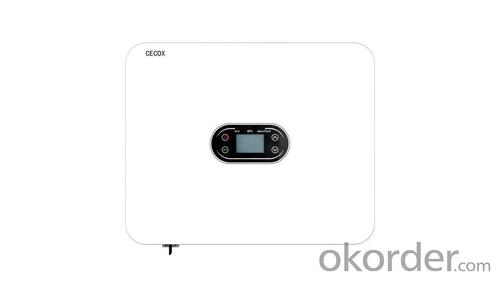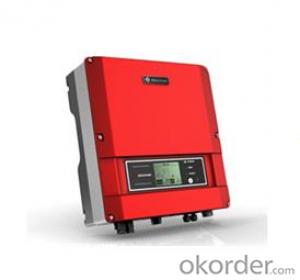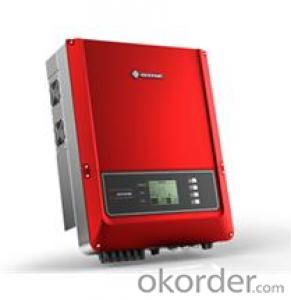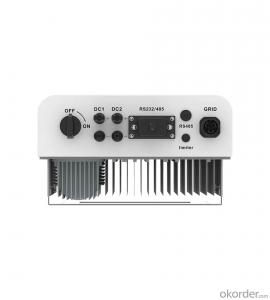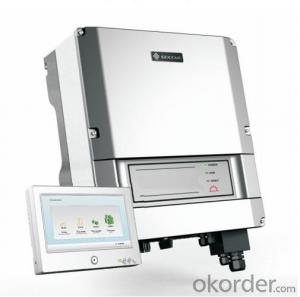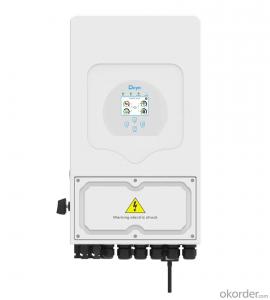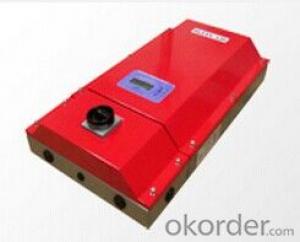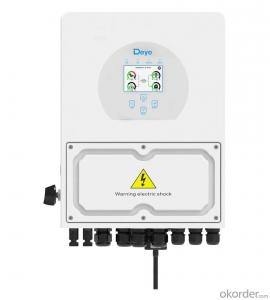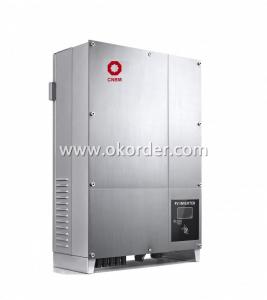3.6KW 4KW 4.6KW 5KW 6KW Single Phase Hybrid solar inverter
- Loading Port:
- SHENZHEN
- Payment Terms:
- TT OR LC
- Min Order Qty:
- 30 unit
- Supply Capability:
- 500 unit/month
OKorder Service Pledge
OKorder Financial Service
You Might Also Like
Specification
XD3.6kW-6kW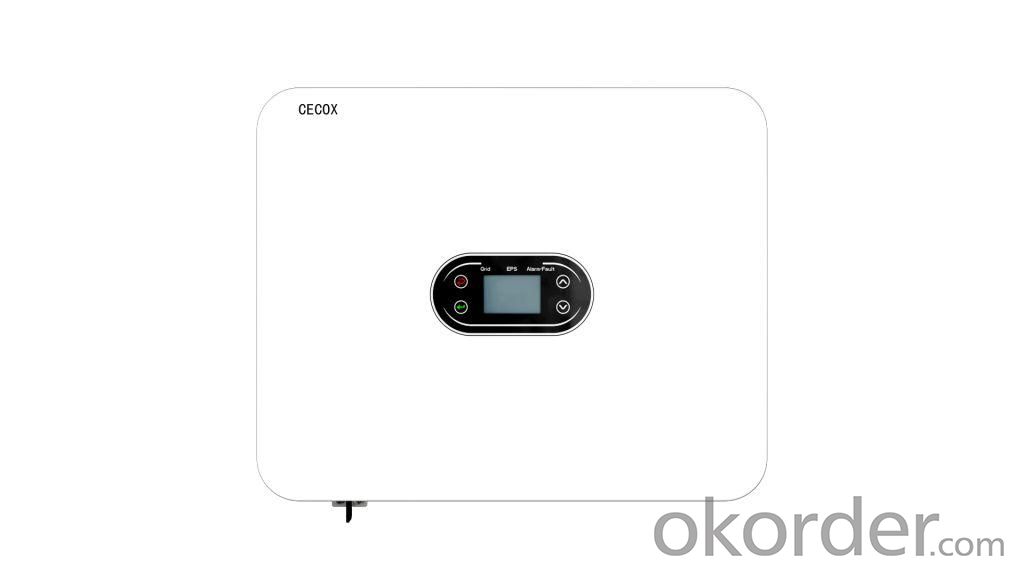
Single Phase Hybrid Inverter
XD3K6TL | XD4KTL | XD4K6TL | XD5KTL | XD6KTL | |
Input(PV) | |||||
Max.PV Input Power | 5.4kW | 6kW | 6.9kW | 7.5kW | 9kW |
Max.PV Input Voltage | 550V | ||||
Start-up Voltage | 100V | ||||
Rated Voltage | 240V | 270v | 300V | 330V | 360v |
MPPT Voltage Range | 100v~550v | ||||
Number of MPP Trackers | 2 | ||||
Max.PV Input Current | 16A | ||||
Output(AC) | |||||
Rated Output Power | 3.68kVA | 4kVA | 4.6kVA | 5k/A | 6kVA |
Max.Output Power | 3.68kVA | 4.4kVA | 4.6kVA | 5.5kVA | 6kVA |
Max.Output Current | 16A | 20A | 20.9A | 22.7A | 30A |
Rated Voltage | 230V | ||||
Rated Frequency | 50Hz/60Hz | ||||
THDi (@Rated Power) | <3% | ||||
Power Factor | 0.8leading-0.8lagging | ||||
Battery | |
Battery Type | Lithium, Lead-acid |
Battery Voltage Range | 40V~60v |
Max.Charge / Discharge Current | 100A |
Communication | CAN |
Efficiency | |
Max Efficiency | 97.5% |
EU Efficiency | 97.2% |
Battery Charge/Discharge Efficiency | 95% |
Protection | |
DC Reverse Polarity Protection / Insulation | Yes |
Over Current / Over Voltage Protection | Yes |
Battery Soft Start Protection | Yes |
AFCI Protection | Optional |
Surge Protection | Type ll |
Communication | |
Display | LCD |
Communication | RS485/CAN/WIFI/4G/LAN/ Bluetooth |
General Data | |
Dimension (W*H*D) | 490x 395x 200 mm |
Weight | 15kg |
Operating Temperature Range | -30℃~+60℃ |
Cooling Method | Natural |
Protection Degree | IP66 |
Max.Operating Altitude | 4000 m |
Noise | ≤25dB |
Relative Humidity | 0~100% |
Self-consumption | <10w |
Topology | High Frequency Insolation (For battery) |
MARKETING & SERVICE NETWORK
CNBM global sales team provides customers with professional and efficient pre-sale, in sale and after-sale services,
and enhances the added value of the brand with high-quality services.
Products Details:
High voltage protection Over load protection
Battery reverse connected protection Dust-proof
Low voltage protection Overheating protection
Output short-circuit protection Insect prevention
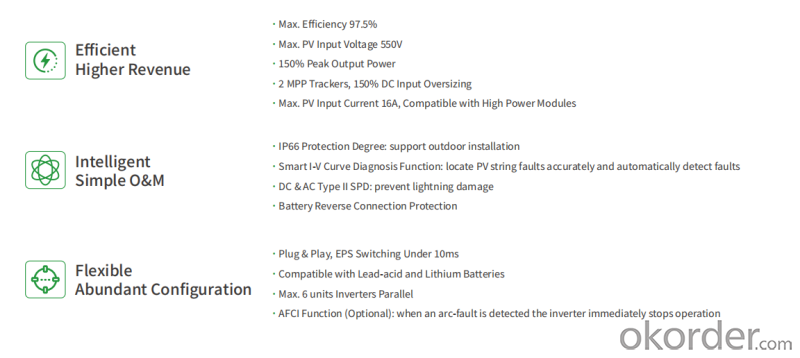
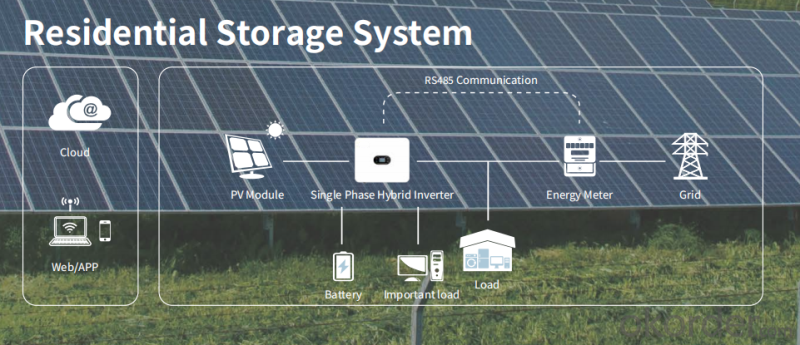

FAQ:
Q1:May I take some samples to test before placing the order ?
A1:Yes, welcome to take some sample to test!
Q2:How about the delivery time?
A2:7 days for sample; 25 days for bulk order.
Q3:What is the warranty of the controller?
A3:1 years warranty.
Q4:How to solve the technical problems?
A4:24 hours after-service consultancy just for you and to make your problem to be solved easily.
Q5:What payment methods do your company support?
A5:T/T, Western Union, Paypal, L/C etc.
Q6:What are the price terms can you offer for us?
A6:We can accept EXW, FOB, CIF and so on.
Q7:Do you have any certifications for your products?
A7:We have ISO9001:2000, CE, RoHS, certificates for all of our products.
- Q: How does a solar inverter communicate with other components of a solar power system?
- A solar inverter communicates with other components of a solar power system through wired or wireless connections. It typically uses communication protocols such as Modbus, CAN bus, or Ethernet to exchange data with devices such as solar panels, batteries, energy meters, and monitoring systems. This communication enables the inverter to receive information about the solar panel's output, battery status, and energy consumption, allowing it to optimize power generation and manage energy flow within the system.
- Q: Can I connect solar panels directly to the grid without an inverter?
- No, you cannot connect solar panels directly to the grid without an inverter. An inverter is necessary to convert the DC (direct current) output from solar panels into AC (alternating current) that is compatible with the grid.
- Q: How do you choose the right size solar inverter for a specific solar power system?
- To ensure optimal performance and efficiency of your solar power system, careful consideration of various factors is necessary when selecting the appropriate size solar inverter. Follow these steps to make the right choice: 1. Calculate your solar power system's total capacity: Begin by determining the combined wattage of all your solar panels. This information can typically be found in the product specifications or obtained from your solar panel manufacturer. 2. Evaluate your average energy consumption: Assess your typical energy consumption to determine the size of the solar inverter required to meet your needs. Take into account peak power usage and potential future increases in energy demands. 3. Match the inverter's capacity with your system's: Ensure that the solar inverter's capacity is equal to or slightly higher than your system's total capacity to achieve optimal performance. 4. Consider the inverter's efficiency: Seek out an inverter with high efficiency ratings. A higher efficiency rating means it can convert a larger percentage of solar energy into usable electricity, minimizing power losses. 5. Select the appropriate inverter type: Decide which type of solar inverter is suitable for your system. The three main types are string inverters, microinverters, and power optimizers. String inverters are the most common and cost-effective choice for small to medium-sized systems, while microinverters and power optimizers are better suited for complex installations or systems with shading issues. 6. Assess additional features: Take into account any additional features offered by the solar inverter. Look for features like monitoring capabilities, grid integration capabilities, and built-in safety features such as arc fault protection or rapid shutdown. 7. Seek professional advice: If you are uncertain about selecting the right size solar inverter for your specific solar power system, consulting a professional solar installer or electrical engineer is advisable. They can help assess your energy needs, system requirements, and provide expert guidance in choosing the appropriate inverter size. Remember, making an informed decision when choosing the right size solar inverter is crucial for your system's overall performance and efficiency. Take the time to evaluate your system's requirements and seek expert advice to ensure the best outcome.
- Q: Can a solar inverter be used with a solar air conditioning system?
- Yes, a solar inverter can be used with a solar air conditioning system. The solar inverter helps convert the DC power generated by the solar panels into AC power that is suitable for powering the air conditioning system. This allows for the utilization of solar energy to cool or heat a building, making it an eco-friendly and energy-efficient solution.
- Q: What are the signs of a faulty solar inverter?
- Some signs of a faulty solar inverter include a complete loss of power generation, inconsistent or fluctuating power output, error messages or fault codes displayed on the inverter, unusual noises or excessive heat coming from the inverter, and a lack of communication or connection with monitoring systems.
- Q: What is the maximum AC voltage that a solar inverter can provide?
- The maximum AC voltage that a solar inverter can provide typically depends on the specific model and its specifications. However, most residential and commercial solar inverters provide a maximum AC voltage output of around 240 volts or 480 volts, depending on the electrical grid requirements and system configurations.
- Q: What is the role of a grid monitoring feature in a solar inverter?
- The role of a grid monitoring feature in a solar inverter is to constantly monitor the electrical grid to ensure that the solar energy being produced by the inverter is compatible with the grid's requirements. It helps in maintaining the stability and reliability of the grid by detecting any abnormalities or fluctuations in voltage or frequency. Additionally, it allows the inverter to automatically disconnect from the grid in case of a grid failure or disturbance, providing safety and protection to both the solar system and the grid.
- Q: Can a solar inverter be used with solar-powered agricultural equipment?
- Yes, a solar inverter can be used with solar-powered agricultural equipment. A solar inverter is an essential component of a solar power system as it converts the direct current (DC) electricity generated by solar panels into usable alternating current (AC) electricity. This AC electricity can then power various agricultural equipment, such as irrigation systems, pumps, and machinery, allowing them to operate efficiently using clean and renewable solar energy.
- Q: What is the maximum DC input current for a solar inverter?
- The maximum DC input current for a solar inverter will depend on the specific model and specifications of the inverter being used. It is important to refer to the manufacturer's documentation or consult the product's technical specifications to determine the maximum DC input current for a particular solar inverter.
- Q: Can a solar inverter be used with a solar-powered vehicle?
- Yes, a solar inverter can be used with a solar-powered vehicle. The solar inverter is responsible for converting the DC power generated by the solar panels into AC power that can be used to power various devices and components in the vehicle, such as the motor, lights, and electronics.
Send your message to us
3.6KW 4KW 4.6KW 5KW 6KW Single Phase Hybrid solar inverter
- Loading Port:
- SHENZHEN
- Payment Terms:
- TT OR LC
- Min Order Qty:
- 30 unit
- Supply Capability:
- 500 unit/month
OKorder Service Pledge
OKorder Financial Service
Similar products
Hot products
Hot Searches
Related keywords

